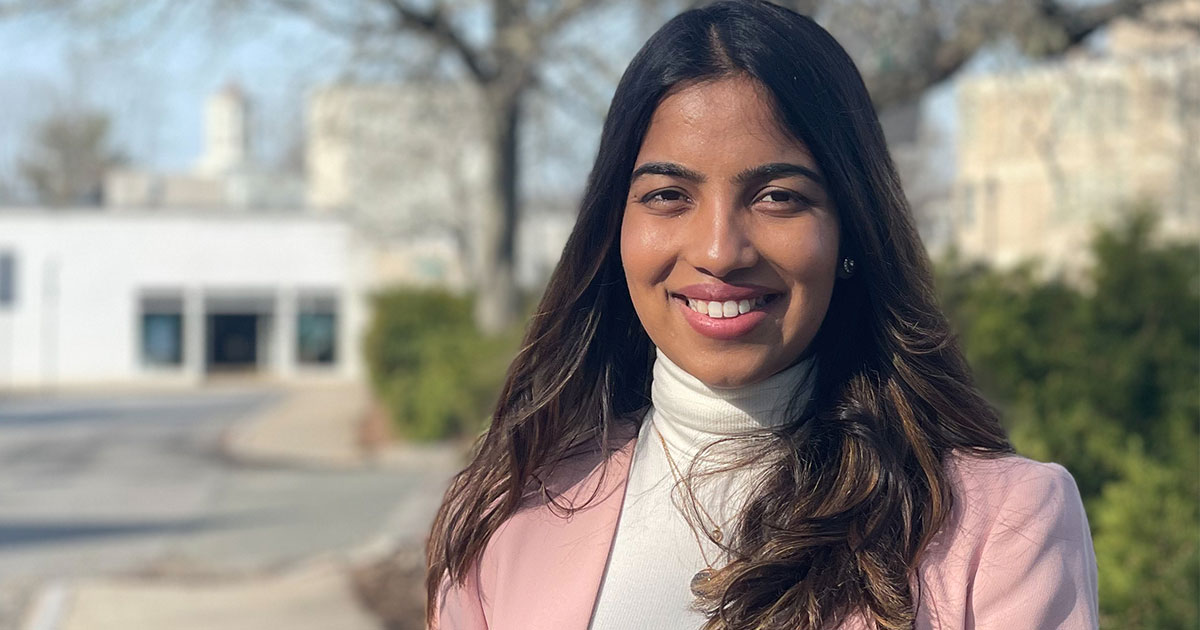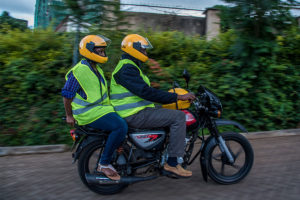Vaidehi Tembhekar MBA’21 on Making a Social Impact in Kenya

On the streets of Nairobi, the capital of Kenya, the buzz of motorbikes is a common sound. Riders whiz about the city, many earning a living by carrying passengers or packages.
It’s not easy work. Much of the riders’ time is spent waiting, hoping that someone will hire them. On average, they may earn about $10 a day, but $2 of that will go to pay for gas. Another $4 may go toward renting the motorbikes, because many riders don’t own their own.
In the end, that leaves the riders a profit of only $4 or $5 a day. “They are not making much at all,” says Vaidehi Tembhekar MBA’21.
To help riders in her native Kenya earn a better living, Tembhekar founded the ride-hailing app Busy Boda with her brother, Atharva. Serving as sort of an Uber for motorcycle riders, the app aids riders in connecting with customers, and the venture also is working to help them pay for insurance and their own motorbikes.
“We wanted to do something that is socially impactful. We wanted to improve the lives of people,” Tembhekar says. “The more we realized the problems the riders faced, it made us more passionate to help them.”
This coming Saturday, May 15, Tembhekar will serve as the graduate student speaker at the digital Class of 2021 Commencement ceremony. “I am very excited, to say the least,” she says.
The entrepreneur will share her experiences and reflect on the challenges the past year has brought and how the Class of 2021 rose to meet them. “I will be talking a lot about how our fighting spirit unites us at Babson,” she says.
An Entrepreneurial Life
For much of her life, Tembhekar has been surrounded by the swirl and energy of entrepreneurship. Born in India, she was raised mostly in Kenya, and when she was 11, her father started his own energy venture there. Today, that thriving business, Lean Energy Solutions, provides biofuels and solar power, and it has more than 70 permanent employees.
Watch Babson’s virtual Commencement ceremonies at babson.edu/watchcommencement.
When she was younger, however, her father’s business was much smaller, with two of its secretaries working out of a spare bedroom in the family home. “We have seen the growth in his entrepreneurial journey,” Tembhekar says.
Conversations at home often focused on business, and Tembhekar listened as problems were hashed out and solved. She and her brother felt inspired to start their own venture someday, and her father encouraged them. “He always encouraged us to work for ourselves, to make an impact on society, and employ people,” Tembhekar says.

Several years ago, while the family was on holiday in India, they noticed all the people with motorcycles, and Tembhekar’s brother said, “Why don’t we do a taxi service?” That comment became the start of the idea for Busy Boda. “My dad, being my dad, said, ‘That’s a fantastic idea,’ ” Tembhekar says. “Both my mum and dad are very entrepreneurial, and they are always very excited about all the ideas we come up with.”
Their parents also were supportive when, in an early version of Busy Boda, the developers the siblings had paid to develop the app did an inadequate job and then disappeared. Tembhekar and her brother were despondent, but their parents told the siblings not to give up. “They encouraged us to keep at it, and so we restarted the journey,” Tembhekar says.
The Many Challenges
As they researched and worked on their business, the siblings came to understand the many challenges the motorcycle riders face. They met one who had been in an accident, and despite the fact he had insurance, a rarity for motorcyclists in Kenya, he didn’t receive any compensation for eight months. And, when the compensation finally came, he received only a quarter of what he had been promised. Tembhekar fears that such experiences are common. “These guys are taken advantage of,” she says. “If this is happening to him, how many others is this happening to?”
Just the act of finding customers can be frustrating. After the morning rush, motorcyclists spend their days clustered together in essentially a taxi stand for motorbikes, hoping a customer will approach and trust them enough to hire them. “Most of the day, they are just idle,” Tembhekar says.
“We wanted to do something that is socially impactful. We wanted to improve the lives of people.”
Vaidehi Tembhekar MBA’21
The app makes this process of finding customers a lot easier, broadening motorcyclists potential customer base beyond those who just happen to pass by the motorcycle stand. Busy Boda also offers micro loans to motorcyclists so they can buy their own motorbikes, instead of being stuck renting from others, and make repairs as needed. Additionally, the venture partners with an insurance company to provide proper and affordable insurance to riders.
In the future, the company hopes to expand beyond Nairobi to the rest of Kenya and East Africa. With roughly 95 percent of motorcyclists being men, it also hopes to encourage more female riders. For the time being, however, the pandemic has slowed some of Busy Boda’s growth. “You can’t social distance on a motorbike,” says Tembhekar, though the venture has increased the deliveries it is making.
All of these efforts have earned Tembhekar and Busy Boda some well-deserved recognition. Last year, Busy Boda won Babson’s prestigious B.E.T.A. Challenge, and, this spring, Tembhekar was named student Commencement speaker. Her speech Saturday will reflect on what the past year has meant to her and her classmates.
“I will be speaking about the absolute roller coaster of a year that it has been,” she says, “and how we all navigated through these uncertain times to successfully take that next step in our future and get a step closer to achieving our big dreams.”
Posted in Community, Entrepreneurial Leadership




